Karl Haushofer, The Third Reich and the Occult: Reality and Fiction
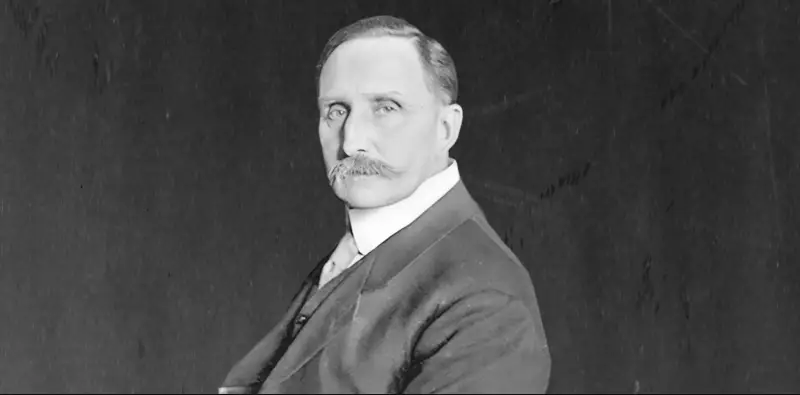
Historical The formation of geopolitics as a political science is inextricably linked with the name of the German geographer and sociologist Karl Haushofer. He is rightfully considered one of the founders of the continental European school of geopolitics. Geopolitics is now studied in universities, but for a long time it was considered by political scientists as a “fascist” science.
This is due to the fact that the German school of geopolitics (founded by Ratzel), the brightest representative of which was K. Haushofer, was practically destroyed after World War II, under the slogan of denazification, as “providing justification for Nazi military expansion.” In the West, Haushofer was hailed as “Hitler’s teacher” and almost the main ideological inspirer of National Socialism, even though he was never a member of the NSDAP and only met the Fuhrer a few times.
The Office of the US General Counsel stated in September 1945 that “Haushofer was Hitler's intellectual godfather. It was Haushofer, not Hess, who wrote Mein Kampf... Geopolitics was not just an academic theory. It was an energetic plan to conquer central Eurasia and dominate the world.".
The German émigré publication Neue Weltbühne proclaimed from Paris back in January 1940: “Everything that Hitler has achieved or wants to achieve in the future... is the program of the geopolitician Karl Haushofer; he thinks, plans and recommends; Hitler obeys" [2].
Some fans of sensations went even further - they began to claim that Haushofer taught Hitler secret occult sciences. Allegedly, not only was he "trained" in magical societies and was a member of the Thule Society (which he was never actually a member of), but he also founded the secret society "Vril". The figure of Haushofer thus began to be surrounded in such near-fantasy literature with a sort of mystical aura of a powerful Nazi puppeteer wielding supernatural powers.
In 1962, the German political scientist Karl Dietrich Bracher, in his classic study Die nationalsozialistische Machtergreifung, first tried not to go to extremes (although he did not always succeed) and, pointing out the close connection between Haushofer and Deputy Fuhrer Rudolf Hess, nevertheless rejected both an overly simplified view of the direct line of influence of Haushofer on Hitler [4].
However, there is still no consensus among historians on this issue.
Where is the truth? Who really was Karl Haushofer? Was he really Hitler's inspiration and involved in the occult?
In this material, the author will try to dispel some legends regarding the personality of the German scientist.
Geopolitical concepts of Karl Haushofer
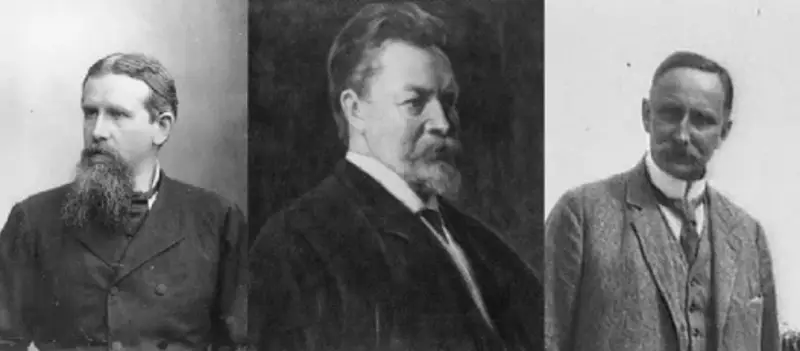
Karl Haushofer was born on August 27, 1869 in Munich in the family of Professor Max Haushofer. He chose a military career, serving in the Bavarian corps and then as a teacher at a military academy. In 1896, Karl married Martha Meyer-Doss, who came from a half-Jewish family [3].
In 1908 he was appointed military attaché to Japan. For Japanese society, it was a time of post-war euphoria caused by the victorious war with Russia, a time of plans to build a “Great Japan”, including the Kuril Islands and Sakhalin, Manchuria, part of mainland China, Taiwan, the countries of Southeast Asia up to Australia, many islands of the Pacific Ocean [5].
Acquaintance with the spiritual world of the Japanese made a great impression on Haushofer, and upon returning to Germany he began working on a book about Japan. It was published in 1913 under the title "Dai Nihon". His first work received positive reviews and prompted the author to write a dissertation [3].
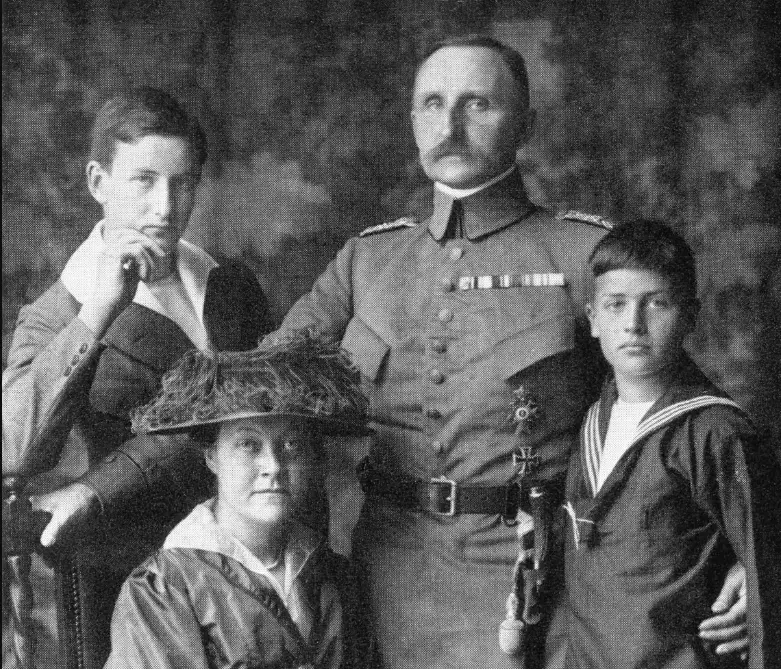
Soldier and geopolitician Karl Haushofer (1869–1946) with his wife Martha and sons
The First World War interrupted his scientific career. K. Haushofer goes into the army and takes part in battles on the Western and Eastern fronts. At the end of the war, he retired with the rank of general and received the position of privatdozent of geography at the University of Munich [3].
The scientist’s subsequent works were also devoted to Japanese and Far Eastern issues in general: “The Japanese Empire in its Geographical Development” and “Geopolitics of the Pacific Ocean”. Then Haushofer begins to comprehend the geopolitical situation in the world as a whole and publishes the works “World Politics Today”, “Status Quo and the Renewal of Life”, “Geopolitics of Panideas” [5].
In 1927, Karl Haushofer published a major work, “Borders in their Geographical and Political Significance,” in which he appears as a follower of Ratzel. For him, the concept of the state as a living organism is the final truth, and the main task is the creation of a holistic doctrine about the living organs of this organism - the borders of the state. Haushofer, on 230 pages, analyzes in detail the scientific literature on this topic (works of F. Ratzel, O. Maul, R. Sieger, E. Schene, J. Bryce, G. Taylor, F. Turner, D. Uehara, etc.), considers boundaries from the point of view of their geographical, biogeographical, psychological, historical and political essence [5].
In 1931, Haushofer’s next major work, Panideas in Geopolitics, was published, in which he substantiates the essence of practical geopolitics (today we would say “geostrategy”) as the implementation of large-scale foreign policy concepts - panideas. Panideas, according to Haushofer, are proclaimed by entire nations, cover large areas and have global political significance [5].
Haushofer put forward the idea of “pan-regions” - large spaces into which the world is divided according to the “meridional” principle, with the center of each region in the northern hemisphere and the periphery in the southern. Haushofer identified four pan-regions - America, centered in the United States, Europe - Middle East - Africa, centered in Germany, East Asia and the Pacific, centered in Japan, Russia - Russian Plain and Siberia, Persia and India.
It is worth noting that Haushofer was a very erudite person and studied the works of his compatriots, as well as the Englishman Mackinder (and his Hartland idea), the Swede Kjellen, the Frenchman Vidal de la Blache, the American Mahan and other geopoliticians. He did not ignore Russian scientists, especially the works of the publicist and sociologist N. Ya. Danilevsky. Thus, Haushofer included the projects of Pan-Slavists, Pan-Germanists, Pan-Islamists, Sun Yat-sen, N. Ya. Danilevsky, and the Monroe Doctrine as typical panideas.
Haushofer defined geopolitics as “the study of the connections of political processes with the earth” and as “an art capable of guiding practical politics.” He called on geopoliticians to teach the people to “think geopolitically” and politicians to “act geopolitically.”
According to K. Haushofer, the difference between political geography and geopolitics was that when considering the problem of space and state, “political geography considers the state from the point of view of space, and geopolitics considers space from the point of view of the state.” Moreover, he believed, “geopolitics prepares instruments for political action and directives for political life in general.” The goal of geopolitics, according to Haushofer, should be to predict the expected global political development in the future and identify its main features [3].
In his most famous geostrategic work, “The Continental Bloc” (1940), which was written in the context of the rapprochement between Germany and the USSR, Haushofer wrote that the time had come to implement the panidea that was deadly for the Anglo-American alliance - to create a continental bloc: Central Europe - Eurasia - Japan, which is actually a Heartland, dominating the World Island (Eurasia and Africa) and at the same time dividing it into spheres of influence.
Haushofer, Hitler and Nazism
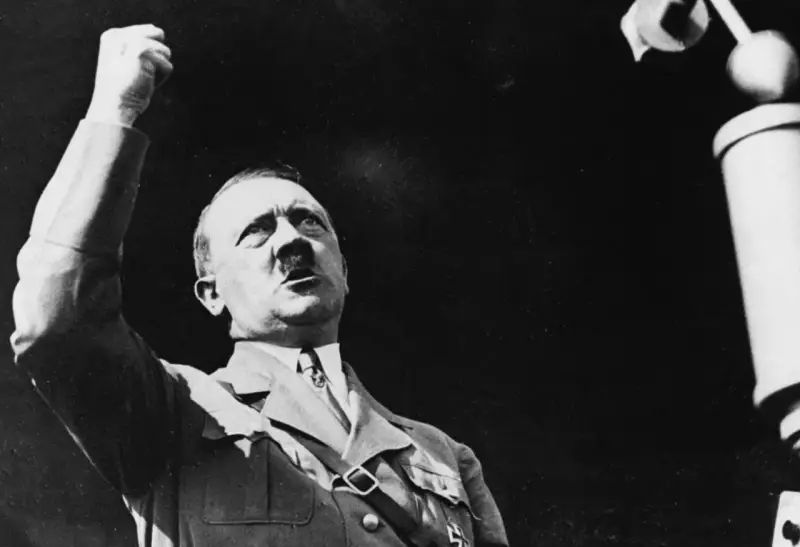
Assessing the post-war structure of Europe, K. Haushofer came closer in his positions to “revolutionary conservatism” on the issue of understanding the essence of the Versailles system, considering it “the continuation of the war by other means.” The created system of the “new order,” in his opinion, was unfair, since it violated the principle established by nature of the natural distribution of space between countries, creating in its place a bloc of buffer states that did not allow Germany to realize vital growth [3].
K. Haushofer considered the problem of living space one of the most important issues of geopolitical science as a whole. In the article “Fundamentals, Essence and Goals of Geopolitics,” published in 1928 in the collection “Elements of Geopolitics,” he emphasized that this young science, if understood correctly, was one of the most effective means of fighting for a fair distribution of living space on Earth [6] .
It is because of this that for decades in Western and especially Soviet literature, Karl Haushofer was portrayed as the fascist theorist who gave Adolf Hitler the idea of the “conquest of Lebensraum.” And now in historical and journalistic literature one can quite often find statements that Haushofer was an “influential adviser to Hitler.” Moreover, he is credited with almost participating in the compilation of Mein Kampf [7].
Let's try to figure out how true this is.
First of all, it should be noted that Haushofer's influence on Hitler and the National Socialist ideology is greatly exaggerated. Even such proponents of Haushofer's significant influence on Hitler as historian Holger G. Herwig admit that “Haushofer's influence on Hitler is difficult to determine. They had fewer than a dozen meetings, mostly public. Contrary to popular belief, Haushofer did not say a word about Mein Kampf; he refused to review it in his journal Zeitschrift für Geopolitik, since it had “little to do with geopolitics” [2].
Haushofer was introduced to Hitler by the professor's student, Rudolf Hess, who later became Deputy Fuhrer in the Nazi Party. It was Hess who brought Haushofer's ideas to Hitler's attention [7]. At the same time, one should not overestimate the degree of influence of Hess himself on Hitler - it was very relative [6].
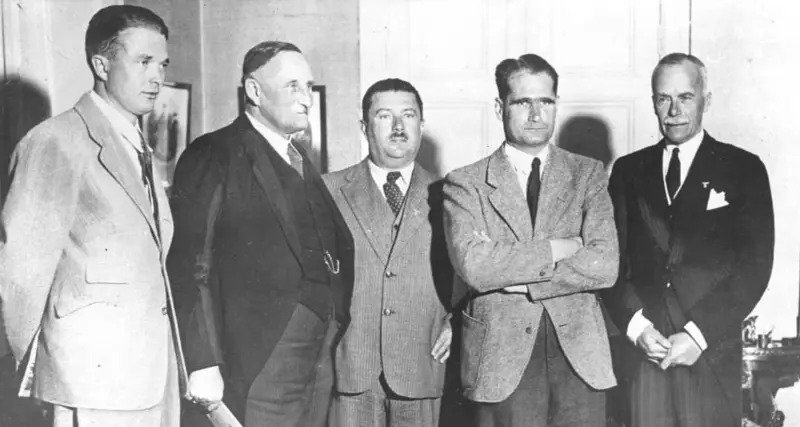
Julius Schaub, Hitler's adjutant, recalling the Fuhrer's attitude towards Haushofer, clearly pointed out that rumors about the influence of Haushofer's ideas on Hitler were clearly exaggerated. In total, from 1922 to 1938, Hitler and Haushofer met no more than ten times. The Fuhrer never considered the professor of geopolitics a National Socialist, although he found that some of his theses could be used for the tasks of the NSDAP. Since he knew about the “Jewish origin” of Haushofer’s wife, he always treated the professor of geopolitics with “some caution” [1].
Being a patriot, Haushofer, of course, tried to influence German policy in order to direct it in the right direction, but it is one thing to “try to influence”, quite another to “exert a key influence”. Hitler, apparently, was familiar with geopolitical theories - one can assume that when making his decisions in 1940-1941, he could be guided by the principle: “Who owns Eastern Europe, dominates the Heartland; whoever rules the Heartland rules the World Island; whoever rules the World Island dominates the world” [8].
But this formula for world domination does not belong to Haushofer (the Soviet historian V.I. Dashichev, for example, mistakenly attributes it to the German thinker), but to the English thinker Sir Halford J. Mackinder. It is he who owns the theory of Hartland, which acts as the “citadel of the World Island.”
There is reason to assert that it was thanks to the efforts of K. Haushofer that Hitler became acquainted with F. Ratzel’s “Political Geography” and subsequently used some of his theses in “Mein Kampf” [3]. At the same time, Hitler throughout his life refused to acknowledge any intellectual debt to the Munich geographer; Neither the name "Haushofer" nor the term "geopolitics" are mentioned in his most important works and public appearances.[2]
When Haushofer’s patron Rudolf Hess flew to England, Hitler decided to take out all his anger “on the professor who had intermarried with the Jews” [1]. From the memoirs of W. Schellenberg it is known that Haushofer was involved in the investigation in connection with Hess’s flight.
Nazi Germany's ideas for world conquest under Adolf Hitler were very different from Haushofer's. In particular, Haushofer advocated the Germany-Russia-Japan bloc and was opposed to the invasion of the Soviet Union. He wrote like this:
Most leaders of the National Socialist Party held diametrically opposed views on other countries than Haushofer himself. The “world system” he proposed was not taken into account by anyone [1].
K. Haushofer spoke out for the creation of a complex system of geopolitical alliances, warned against adventuristic aggression against the East and predicted that the German army would be defeated “if it tried to swallow the vast lands of Russia.” As American authors Palmer and Perkins note, for such “sedition” Haushofer ended up in the Dachau concentration camp [10].
The famous German specialist on the history of Nazism G. J. Jacobsen, in his two-volume work “Karl Haushofer: Life and Work,” noted Haushofer’s cooling towards Nazism from the mid-1930s and his subsequent removal from active political activity. The contradiction between the concept of the Euro-Asian continental bloc of K. Haushofer and Hitler’s policy, which reached its climax in aggression against the USSR, according to Jacobsen, is a clear example of the originality of his ideas, their difference from Nazi political practice [3].
Another historian F. Ebeling in the study “Geopolitics: Karl Haushofer and his doctrine of space. 1919–1945” stated the difference between geopolitical and Nazi approaches to resolving foreign policy problems. The first was based on a strategy of geopolitical alliances as opposed to Hitler's adventurist line.
Ebeling focuses on the tragic fate of K. Haushofer, which turns out to be inseparable from the collapse of German geopolitics. The author believes that the difference in the use of means between geopolitics, based on the tactics of state agreements, and the Nazi foreign policy concept, based on the strategy of war, does not allow them to be identified.
Thus, claims that Haushofer was "Hitler's teacher" and the main inspirer of Nazism appear to be unfounded.
Thule Society and the Occult

The topic of the occult and its role in Nazi Germany continues to be quite popular in literature. Thus, in historical fiction, journalism and very dubious historical literature dedicated to the “occult Reich,” Karl Haushofer appears as the “highest initiate” of the Thule society and perhaps the main magician of the Third Reich.
A significant part of such information about Haushofer is taken from the book “The Morning of the Magicians” by French writers Jacques Bergier and Louis Pauvel. It tells colorful stories that Haushofer “was a member of the Luminous Lodge, a secret Buddhist society in Japan and the Thule Society. Not at all as a geopolitician, but as a student of the Eastern Mysteries, Haushofer proclaimed the need for a “return to the origins” of the human race in Central Asia” [11].
Historian Nicholas-Goodrick Clarke, who has examined the role of the occult in Nazi ideology, notes that such claims are false because there is no evidence of Haushofer's connection to the Thule Society.[11]
The founder of the Thule Society, Rudolf von Sebottendorff, in his book “Before Hitler Came” (Bevor Hitler kam: Urkundlich aus der Frühzeit der Nationalsozialistischen Bewegung), which was published in Russian, never mentions Karl Haushofer.
If you believe the “science fiction historians,” then Professor Karl Haushofer continued the work begun by Dietrich Eckart, that is, Hitler’s initiation into the “secret sciences.” Haushofer allegedly belonged to a group of “seekers of truth” that formed around George Ivanovich Gurdjieff, who in literature appears not only as an agent of the Russian secret police, but also as a teacher of the young Dalai Lama [1]. Subsequently, Haushofer allegedly creates the esoteric society "Vril", inspired by Tibetan mysticism.
At the same time, as historian Andrei Vasilchenko rightly notes, there is in fact no historical evidence that Haushofer was ever in Tibet [1].
For the most part, all the “evidence” of Haushofer’s participation in secret esoteric societies is very dubious and has a very distant relationship to history.
However, the topic of occultism in the Third Reich is a topic for a separate article.
Conclusion
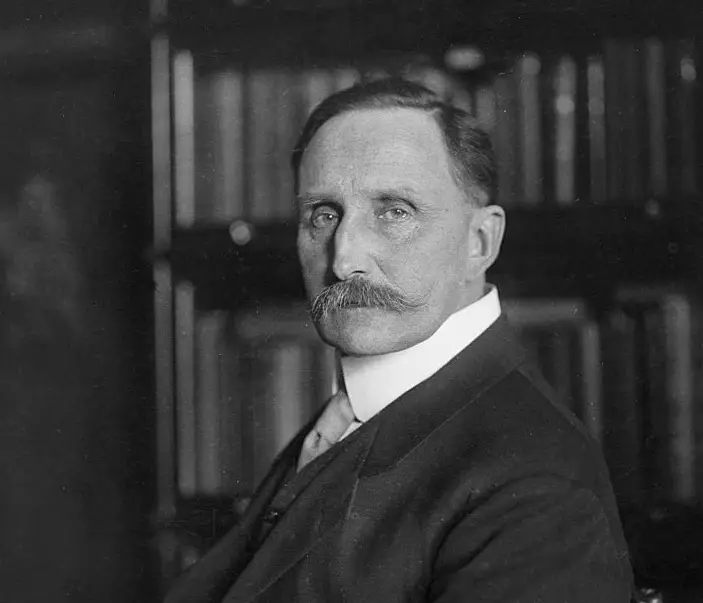
To summarize, it should be noted that Karl Haushofer was a multifaceted person: geographer, journalist, professor, poet, soldier, teacher, writer, creator of the geopolitical doctrine about the need to create a continental bloc or axis: Berlin - Moscow - Tokyo. His career took place during the most fateful period in German history.
Haushofer's relationship with the Nazi regime was controversial.
On the one hand, he considered it an important task to unite all Germans within the framework of the German state, and therefore the bloodless annexation of Austria and the Sudetenland achieved by Hitler by the end of 1938 seemed to him the height of geopolitical art.
On the other hand, he understood that if Germany, acting alone, continued to expand its living space in Europe, this would lead to war with the leading European powers.
Haushofer shared Bismarck's thoughts about the inadmissibility of a war on two fronts for Germany - in the West and in the East, for this reason he tried to influence the leadership of the Third Reich so that it would build its policy on a scientific geopolitical basis and take steps to create a continental bloc Berlin - Moscow - Tokyo. However, Hitler disdained the professor's ideas.
After Hess's famous flight to Great Britain, Haushofer's already not very significant influence on German politics fell seriously. In May 1941, immediately after this flight, Haushofer was detained on suspicion of complicity in its organization and interrogated. They could not bring any serious charges against him, but relations with the regime were completely ruined.
Another blow of fate for Karl Haushofer was the investigation of the plot to assassinate Hitler on July 20, 1944. His son Albrecht was well acquainted with many of its participants and probably knew about their plans. For several months he managed to hide. In the summer of 1944, unable to find Albrecht Haushofer, the Gestapo arrested his father. K. Haushofer spent about a month in the Dachau concentration camp. Haushofer Jr. was arrested by the Gestapo just before Christmas, and on the night of April 22-23, 1945, when fighting was already going on in Berlin, Albrecht, along with a group of other prisoners, was shot [12].
On March 10, 1946, Karl Haushofer and his wife committed suicide. The reason for committing suicide was a summons to the Nuremberg Tribunal to testify. The reasons, naturally, were of a deeper nature.
Germany, of which Haushofer was a patriot, was once again defeated and humiliated. Geopolitics, to which the scientist’s entire life was devoted, did not live up to the hopes placed on it and was no longer needed by anyone. Son Albrecht, whose abilities Karl Haushofer admired, died in the dungeons of the Gestapo.
Thus, K. Haushofer lost almost everything that was dear to him, and charges of collaborating with the Nazis and, possibly, imprisonment awaited him [12].
Haushofer's suicide marked the symbolic completion of the final stage in the development of the German school of classical geopolitics.
Использованная литература:
[1]. Vasilchenko A.V. The gloomy genius of the Third Reich. Karl Haushofer. – M.: Veche, 2013.
[2]. Holger H. Herwig (1999): Geopolitik: Haushofer, Hitler and lebensraum, Journal of Strategic Studies, 22:2–3, 218–241.
[3]. Artamoshin S.V. Ideological origins of National Socialism. – Bryansk: BSU Publishing House, 2002.
[4]. See Karl Dietrich Bracher, et al., Die nationalsozialistische Machtergreifung. Studien zur Errichtung des totalitären Herrschaftssystems in Deutschland 1933/34 (Cologne and Opladen: Westdeutscher 1962) p. 226.
[5]. Isaev B. A. Geopolitics: Textbook. Ed. 2nd, corrected and supplemented - St. Petersburg: Peter. 2016.
[6]. Rukavitsyn P. M. German school of classical geopolitics: stages of evolution and contribution to the development of science.
[7]. Haushofer K. About geopolitics. Works of different years // M.: Mysl, 2016.
[8]. Mackinder HJ Democratic ideals and reality. London, 1919.
[9]. Quote from: Salfetnikov D. A. Geopolitics: history and modernity: textbook. manual / D. A. Salfetnikov. – Krasnodar: KubSAU, 2018.
[10]. Palmer N.D., Perkins H.S. International Relations. The World Community in Transition. Third Edition. Boston, 1969. P. 43.
[eleven]. Goodrick-Clark N. Occult roots of Nazism: Secret Aryan cults and their influence on Nazi ideology. – St. Petersburg: Eurasia, 11.
[12]. Rukavitsyn P. M. German classical geopolitics during the period of fascist dictatorship
Information